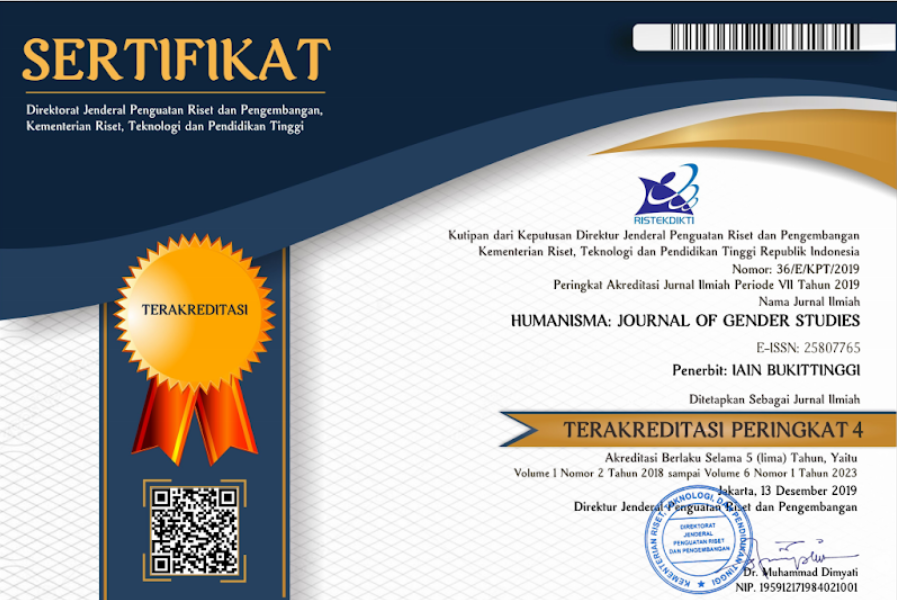WOMEN IN THE IDENTITY CRISIS OF FEMINISM; A CRITICAL ANALYSIS ON GENDER MOVEMENT BASED ON ISLAMIC PSYCHOLOGY PERSPECTIVE
Authors :
Abstract
This paper attempted to analyze critically the women's movement that had been developing so far and tried to offer the ideology of the gender movement based on the values of humanism of Islamic Psychology. This study used a qualitative methodology with a literature approach. The results showed that (1) the male clone tendency in the women's movement had actually been predicted by various parties, including by the female activists. Because of the obsession to equalize the active role of women as equal to men, the women's movement was trapped in standardizing themselves with male masculinity figures. On one hand, they rejected male domination on women, but on the other hand the ambitions of their movements are directed towards seizing the dominant patriarchal system and violating it under the authority of women. Even though Islam places women in the frame of proportionally optimistic rational roles. That is, Islam does not make women fully pretend to be 'backward' entities so that it does not allow them to gain enlightenment and Islam rejects thoughts that are too optimistic to position 'front' women as the sole determinant of their lives and must be above men. Both of these views have reduced women to fall into the destruction or glorification of human quality by ignoring the greatness and power of Sunnatullah over the surrounding conditions; (2) Acording to the values of humanism of Islamic Psychology, the ideology of the gender movement should depart from the needs and be based on a) Women’s self-actualization rather than self-exploitation; b) Women’s Active participation rather than their mobilization and domestication. (c) Partnership rather than rivalism.
Full Text:
PDFReferences
Bem, Sandra Lipsits, (1993), The lenses of Gender. New Haven: Yale University Press.
Diamond, Irene dan Gloria Leman Orenstein (ed.) (1990), Reweaving the world; the emergence of Ecofeminism. San Francisco: Sierra Club Books.
Dzuhayatin, Sri Ruhaini, (1996), Mencari Format Gerakan Strategis Perempuan Indonesia; Sebuah catatan awal in Seminar Nasional: SEMA Adab IAIN Sunan Ampel Surabaya, 30 Januari
Fakih, Mansour, (1996), Analisis Gender dan Transformasi Sosial. Yogyakarta: Pustaka Pelajar.
Gillian, Carol, (1982), In a Different Voice. Cambridge: Harvard University.
Gordon, Suzanne, (1991), Prisoners of Men’s Dream; Striking out for a New Feminine Future. Bosto: Little, Brown and Company.
Hewlett, Sylvia Ann, (1992), When The Bough Breaks; The Cost of Neglecting our Children. Boston: Beacon Press.
Ida, Laode, (2001), Gerakan Wanita dan Dilema Budaya Lokal in Jawa Pos, 5 September.
Illich, Ivan, (1982), Gender. New York: Pantheon Books.
Kristeva, Julia, (1990), Thingking Fragmentt, Psychoanalysis, Feminism and Posmo dernism in the contemporary West. USA: University California Press.
Madjid, Nurcholish, (1996), Islam agama Kebudayaan. Jakarta: Paramadina.
Muhsin, Aminah Wadud, (1994), Wanita di dalam al-Qur’an, terj. Bandung: Pustaka.
Murata, Sachiko, (1999), The Tao of Islam; Kitab Rujukan tentang relasi Gender in Kosmologi dan Teologi Islam. Bandung: Mizan.
Naisbitt, John & Patricia Aburdence, (1990). Megatrends 2000. New York: Avon Books.
Shihab, M. Quraisy, (2000), Gender; Pembagian Kerja Pria Wanita in Jawapos; 12. Desember
Sullivan, Norma, (1991), Gender and Politics in Indonesia in Why Gender Matter in Southeast Asian Politics, Maila Stivens (ed.) Melbourne: Monash University Press.
Thomsen, Veronika B., (1988), Why do Housewives Continue to be created in the third world too? Dalam Women the last Colony, Maria Mies (ed.) (London Zet books Ltd.), 159-166.
Widyaningsih, Wahyuni, (2001), Feminisme, ekofeminisme dan Islam Mistik in Jawa Pos. 20 Januari
Yasanti, (1995). Lika liku Buruh Perempuan. Yogyakarta: Pustaka.
DOI: http://dx.doi.org/10.30983/humanisme.v3i1.1167
Refbacks
- There are currently no refbacks.
Copyright (c) 2019 HUMANISMA : Journal of Gender Studies
License URL: https://creativecommons.org/licenses/by-sa/4.0/
______________________________________________
 | HUMANISMA : Journal of Gender Studies |




